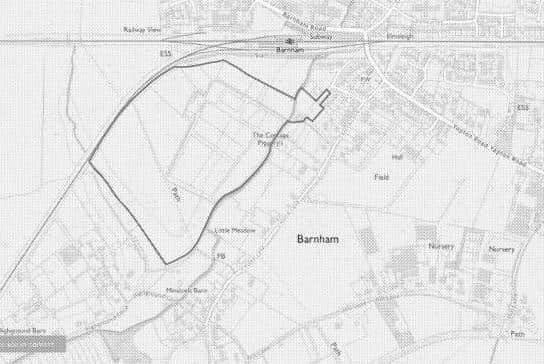Legal challenge stops adoption of Barnham and Eastergate’s updated neighbourhood plan
and live on Freeview channel 276
The Barnham and Eastergate Neighbourhood Development Plan for 2019 – 2031 was being reviewed and an updated version was due to be adopted on Wednesday (26 January).
But a full meeting of Arun District Council was told that the neighbourhood plan could not be presented or formally ‘made’ due to a legal challenge.
Advertisement
Hide AdAdvertisement
Hide AdPlanning policy committee chair Richard Bower (Con, East Preston) explained to the meeting that he could not recommend the plan for approval.


“Unfortunately, I can’t propose the recommendation,” he said.
“We’ve been advised by the council’s monitoring officer that the process of making the modified Barnham and Eastergate Neighbourhood Plan has been challenged by judicial review.
“The council was advised that it is right to accept the developer’s request not to take this item tonight as the developers are likely to get an injunction anyway.”
Advertisement
Hide AdAdvertisement
Hide AdThe revised plan had passed an examination by a planning inspector in October 2021 – one of the final steps in seeing a plan legally adopted.
Christopher Lockhart-Mummery QC, who recommended the plan for approval, concluded that the updated plan did not represent a ‘substantial change’.
If adopted, the plan would have made provision for 117 homes on three different sites.
But a recent appeal, decided last month, overturned Arun’s decision to deny planning permission for 200 homes south of Barnham’s railway station.
Advertisement
Hide AdAdvertisement
Hide AdThe plans were submitted by Gleeson Strategic Land Limited and would see the total number of homes planned for the area rise.
If the neighbourhood plan had been made, it would not have included the 200 homes and the developer’s legal representative, James Smith Planning Law Services Limited, said this would be ‘wrong, unreasonable and irrational’.
In a letter addressed to Arun District Council, Mr Smith said: “It would plainly be wrong (and unreasonable/irrational) for the council to proceed with the making of NP2 [the revised plan] when, if my client’s challenge succeeds, the examiner will have to reconsider his decision and NP2 will have to be examined under a different procedure and then put to a public referendum before it can be made.”
The letter warned that Gleeson Strategic Land Limited would ‘have no choice’ but to ‘submit a further claim for judicial review’ if the council approved the neighbourhood plan on Wednesday.
Advertisement
Hide AdAdvertisement
Hide AdNeighbourhood plans aim to ‘give communities direct power to develop a shared vision for their neighbourhood and shape the development and growth of their local area’.
This allows them to have input in where new homes, shops and offices will be built and what the buildings should look like.
Local people, town councils, and parish councils are usually consulted as part of the process and the neighbourhood plan is usually aligned with a local plan – in this case the Arun Local Plan – which sets out the needs and priorities of the wider area.
The developer’s legal challenge led Sue Wallsgrove, chair of planning and environment at Barnham and Eastergate Parish Council, to ask: “Are neighbourhood plans worth the paper they are written on?
Advertisement
Hide AdAdvertisement
Hide Ad“This will affect neighbourhood plans nationally,” she said.
“If local authorities don’t have a five year housing land supply, they automatically find themselves being told that development will be presumed to take place – ADC’s land supply is only 2.42 years.”
Ms Wallsgrove has since written to Secretary of State Michael Gove asking him to revoke the appeal decision.
This comes just weeks after the council missed its housing targets which are set by central government.
Advertisement
Hide AdAdvertisement
Hide AdADC will now have less flexibility when it comes to planning decisions and must consider all applications for approval so long as they are deemed ‘sustainable’ and don’t cause ‘harm’ to the local area.